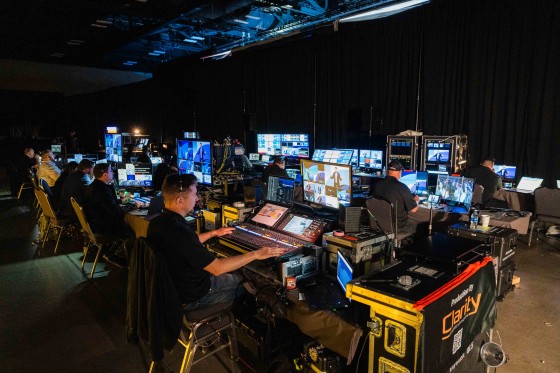
Event logistics refers to the planning and coordination of all operational aspects required to successfully execute an event. It encompasses managing tasks such as venue sourcing, registration, speaker management, attendee engagement, on-site check-in, and the use of event technology.
Events can increase brand recognition by 76%, which is why they’re so valuable to organizations’ marketing strategies. Of course, events aren’t an “easy win.” They require careful planning and execution to get right.
A successful event involves an intricate process of event planning logistics, coordination, and strategic planning. As the saying goes, the devil is in the details. Attention to detail is a key component of optimizing event logistics and one of many critical event planning skills needed to maximize your event ROI.
Let’s explore event planning tips and event logistics best practices so that you can transform this stressful piece of event planning into a streamlined, efficient process.
What are event logistics?
Event logistics refer to the detailed planning and coordination of all aspects of an event to ensure everything runs smoothly from beginning to end. Logistics in event management can include selecting and managing the venue, arranging transportation and accommodation, coordinating equipment and technology, overseeing catering and hospitality shipping and setup of materials, staffing assignments, and more.
In essence, event logistics management is about making sure all the moving parts of an event come together seamlessly. Understanding the role of event logistics is key to successful event planning and execution.
Event logistics best practices
In the complex world of event management, logistics serve as the critical backbone that determines an event's success or failure. While creative vision and marketing may attract attendees, it's the meticulous planning and precise execution of logistical elements that truly bring an event to life.
Effective event logistics are more than just moving people and equipment from point A to point B—they're about creating a seamless experience that appears effortless to participants while strategically managing every behind-the-scenes detail. Let’s discuss how to adhere to event management best practices with logistics at the heart of it all to ensure your events are a resounding success.
- Early planning: Start planning your event as early as possible to allow sufficient time for all logistical arrangements. Make use of event management software to keep track of and manage each step along the way.
- Clear communication: Maintain open lines of communication with your team, vendors, and stakeholders. Create detailed schedules, and distribute them to all parties involved in the event process.
- Venue selection: Choose a venue that aligns with your event’s needs, paying special attention to accessibility and accommodation of your participants. Conduct in-person site visits to ensure the venue meets all requirements.
- Technology integration: Leverage event management software to streamline registration, ticketing, and attendee engagement. Ensure all A/V equipment and tech is tested and functioning properly and that you have all WiFi and onsite resources necessary to execute your event.
- Attendee experience: Focus on enhancing the attendee experience with clear communication, efficient check-ins, accessible services, and well-planned transitions between activities. Think about attendee logistics as part of your broader event strategy as you plan engaging activities, networking opportunities, and other attendee experiences.
- Contingency planning: Prepare for potential challenges by having contingency plans in place. Allocate a portion of your total budget as additional contingency funds in case of unforeseen expenditures that can arise. Do not overlook backup plans for key elements of your event such as power, internet, transportation, late shipments, staffing issues, and equipment.
- Security and risk management: Ensure you have an event safety plan in place that considers risks and security protocols for all scenarios.
- Professionalism and brand continuity: Ensure every aspect of the event reflects your organization’s brand and values.
- Stakeholder management: Carefully coordinate and align priorities of executive leadership, department heads, sponsors, vendors, and attendees. This requires maintaining clear communication channels, establishing reporting hierarchical structures, and aligning all organizational levels. Planners must navigate approval processes and address concerns from multiple decision-makers, all while keeping their target audience top of mind.
- Budget governance: Your budget should be your guidepost throughout the entire planning process, and you’ll need to incorporate logistics into your budget to ensure nothing critical is overlooked. Every little bit adds up, and the logistics can be expensive when you consider the cost of getting materials on site, renting equipment, booking staff travel, etc.
- Data Collection and Analytics: Implement systems to track attendee behavior, measure engagement metrics, analyze networking patterns, and gather feedback through multiple channels.
- Measuring and proving event ROI: Measuring your event return on investment (ROI) through lead generation, brand exposure, attendee satisfaction, and other KPIs determined during initial planning of event objectives requires having systems in place to help you track these key metrics. Consider using event management software that allows you to track attendee engagement, conduct event surveys, and curate event reports to prove your event ROI to stakeholders.
Event logistics: Before, during, and after the event
Successful event execution requires precise planning and coordination across multiple operational phases. While attendees only experience the final product, it's the careful management of logistics at every stage that determines an event's success.
Event logistics operate in three distinct yet interconnected phases: the preparation period before the event, active management during the event itself, and the essential wrap-up activities that follow. Effectively navigating each of these phases is necessary for event organizers to deliver impactful outcomes.
Before the event
- Secure the venue and finalize contracts with vendors
- Plan venue/space layouts, seating, and stage design for all sessions, activities, and experiences
- Determine when and where specific equipment or materials are needed and how they will be transported to the event
- Coordinate transportation and accommodation for speakers, VIPs, and staff
- Plan an onsite registration, check-in, and badging process that maximizes efficiency with the help of tools like on-demand badge printing
- Coordinate food and beverage needs, and ensure mealtimes fit into your event schedule
During the event
- Monitor the event flow and manage any issues that arise
- Check in with speakers and VIPs to ensure their arrival, and adjust as needed for any delays
- Ensure all technical aspects, such as sound, lighting, and presentations, run smoothly
- Facilitate onsite attendee engagement and address any concerns promptly
- Make sure all materials are delivered on time and to the correct locations
- Monitor setup to ensure all spaces and equipment are prepared to your specifications
After the event
- Oversee the teardown and cleanup of the event space
- Pack up and ship any materials that must be returned to an office or other location, and return any rental items
- Ensure all VIPs, speakers, and staff are able to travel from your event as planned
- Conduct a post-event analysis to gather feedback and evaluate the success of the event
- Follow up with attendees, sponsors, partners, and stakeholders with thank-you notes and surveys
What else do event logistics cover?
There are many often overlooked aspects of event production that merit careful consideration, as they significantly impact attendee satisfaction and event outcomes. Let’s consider additional key elements of event logistics that all too often receive insufficient attention during corporate event planning.
Sensory environment management
Sensory environment management, sometimes called “environmental sensory control”, emphasizes the regulation and optimization of sensory inputs in a given environment to enhance comfort and functionality.
This involves careful consideration of the management of ambient factors such as: temperature fluctuations, lighting transitions, and sound bleeding between spaces. These factors all have direct effects on attendee comfort and engagement. To best optimize an event, organizers will want to develop detailed plans for managing these elements throughout the event timeline, including contingencies for unexpected environmental changes.
Data collection infrastructure
Implementing sophisticated yet unobtrusive systems for gathering attendee behavior data, engagement metrics, and real-time feedback require advance planning. Ideally, this infrastructure seamlessly integrates with the event experience while providing valuable insights for stakeholders and ROI analysis.
Staff and attendee wellness
Creating comprehensive support systems for event staff, including scheduled breaks, quiet spaces for rest and recuperation, and backup personnel for key positions, ensures consistent service quality throughout the event.
Event planners need to keep in mind the pace of an event and balance high-energy activities with optimal downtime to maintain attendee engagement and enjoyment while ensuring staff is not overextended. Inattention to staff wellness is directly correlated with a decline in attendee experience and operational efficiency.
Technological redundancy
Beyond basic backup systems, establishing multilayered contingency plans for essential technological components, including payment systems, registration platforms, and communication networks, safeguards against potential disruptions that can derail an otherwise well-executed event.
Cross-functional communication strategy
Develop a proactive management strategy that incorporates comprehensive communication protocols connecting all operational areas, from security to catering to tech support, to enable rapid response to unforeseen issues. To optimize this system, include clear escalation pathways and decision-making hierarchies.
Stakeholder experience integration
Create dedicated touchpoints and experiences for different stakeholder groups, including sponsors, VIPs, media, and partners, while ensuring special arrangements don't detract from the general attendee experience. This requires careful logistical orchestration.
Post-event asset management
Implementing systematic approaches to capturing, organizing, and distributing event assets, such as photographs, presentations, session recordings, and daily recaps, provides immediate value to stakeholders while also building a foundation for future event marketing and improvement initiatives.
When properly integrated into event logistics planning, these elements create a robust framework that supports both immediate event success and long-term stakeholder relationships.
Frequently asked questions
What is the meaning of event logistics?
Event logistics refers to the planning and management of any and all aspects related to an event with the goal of ensuring smooth execution. This includes coordinating transportation, venue selection, equipment storage, and registration, as well as managing the flow of attendees and materials before, during, and after the event. Effective event logistics requires meticulous attention to detail and coordination among stakeholders.
What does a logistics event coordinator do?
A logistics event coordinator is responsible for planning and executing events by managing a range of duties that include coordinating with vendors, suppliers, staff, and other partners. This includes contracting for services such as catering, audiovisual equipment, and transportation.
Logistics event coordinators manage budgets to ensure events stay within financial constraints and oversee event setup, registration, and on-site operations to ensure a seamless experience for attendees. After the event, coordinators can evaluate success through participant feedback and post-event analysis to improve future events.
What are post-event logistics?
Post-event logistics involves the processes and activities that occur after an event has concluded. This includes tasks such as dismantling and removing equipment, ensuring materials are returned in adequate condition, and managing vendor settlements.
Logistics event coordinators are tasked with gathering feedback from attendees and stakeholders to assess the event's success and identify areas for improvement. Conducting a thorough event debrief allows event planners and marketers to reflect on operational processes, vendor performance, and overall execution, which are necessary components for improving future events and ensuring continuous growth.







